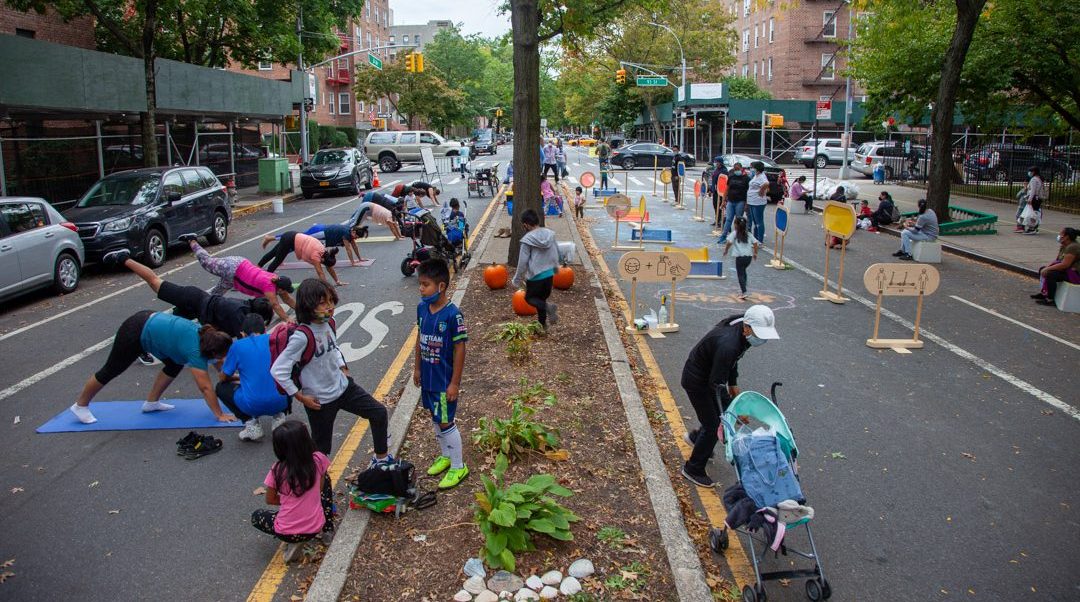The city's public realm czar wants to lift some of the bureaucratic and cost hurdles faced by the largely volunteer open streets groups when they want to run events on car-free roads.
According to a recent report [PDF] by Chief Public Realm Officer Ya-Ting Liu, the city would help train new open streets groups, lower insurance requirements for smaller events, and standardize agreements.
Advocates and open space managers lauded the proposals, which came after they previously warned that the Adams administration was setting them up for failure with high liability requirements for things as simple as hopscotch or hula hoop.
"In order for this to be a more equitable program, you have to remove the barriers," said Jim Burke, an organizer behind the “gold standard” 34th Avenue open street in Jackson Heights.
The report, dubbed "Realm of Possibility," proposed a new "Public Space Academy" to train organizations on best practices to manage open streets and plazas, and would qualify them as "trusted partners," making it easier to get permits for street activations.
Today we released “Realm
— Ya-Ting Liu (@yating_liu) June 13, 2024
Of Possiblity: 15 Ways NYC is Improving Public Space for New Yorkers.” It’s a summary of our policy + project priorities and what New Yorkers can expect in the months to come! See you outside!🌳🛹🚽👷🏻♀️🍴🛝 🗽(1/2) https://t.co/rdE6ce4JMX pic.twitter.com/JNmX2dZu6N
The city plans to also lower or even waive liability insurance needed for "low-touch, low-risk activities," a long-sought reform that currently asks even small groups to carry $1 million in insurance coverage, per requirements of the Mayor’s Office’s Street Activity Permit Office (also known as SAPO). The plan also calls for standardizing maintenance agreements for the road spaces.
SAPO plans to improve its website and communication channels with open space organizations and city agencies, according to the report.
The obscure office has a history of making it hard to reclaim streets from cars by requiring extensive input from community boards and police precincts for events as uncontroversial as a block cleanup.
"Getting any of those permits can bring you into a world where there’s lots of requirements," said Gib Veconi, executive director of the Prospect Heights Neighborhood Development Council, which runs open streets on Vanderbilt and Underhill avenues.
That said, Veconi added that after a while, the application process becomes pretty routine.
"Once you’ve got one month under your belt, you’ve got most of the documents you need," said Veconi.
The biggest obstacle faced by the Prospect Heights open streets group is the cost of labor to manage their barricades. Veconi hoped that the Department of Transportation will come through with a redesign of Vanderbilt Avenue as part of its overhaul of Grand Army Plaza that will bring more permanent improvements to reduce the need for manual moving of the metal fences.
"How long do you have to be in that labor intensive mode until you can get over the hill and you’ve done some kind of design transformation that makes it smoother to operate?" he asked.
The ideas in the report were welcomed by livable streets boosters, since the cost to start and maintain an open street is a key reason why many of the pandemic-era car-free corridors have downsized or disappeared, said Jackson Chabot, director of Advocacy and Organizing at Open Plans (which shares a parent company with Streetsblog).
"Right now, our permitting and usage policies just don’t align with today’s goals of making it easy, and appealing, to activate streets," said Chabot. "Everyday New Yorkers commit to programming their street, but then they’re always on the edge of their seats waiting for permits, or worried that their insurance policy doesn’t cover their needs. It’s the major reason why very popular open streets are shrinking or disappearing."
Veconi said his organization would be happy to pass on its four years' experience of running an open street with the next generation of groups as part of the Public Space Academy.
"This is a great idea and if the city puts something like this together and is looking for existing open street partners to participate and share knowledge, we would be willing to do that," he said.






